In today's digital age, social media has more power to conceive, grow, and mobilize entire social and political movements than ever before.

With the digital landscape evolving in size and influence, individuals, organizations, and entire movements are utilizing social media to spread their message and demand change. Social media activism has become a core tenant to the online experience, for better or for worse.
The Black Lives Matter and Stop Asian Hate movements, the ongoing Israel/Palestine conflict, reproductive rights, and LGBTQ+ legistlation have found footing and support on the digital plains of social media. Activists are taking over the digital space to cultivate awareness, organize protests, and hold individuals and businesses accountable.
So what does this social media activism mean for businesses?
Brands are scared of offending current and potential customers, but research shows that consumers, especially Millennials and younger generations, want to know what their chosen businesses believe in.
90% of consumers state that authenticity is important in deciding which businesses to support, according to a recent survey by Stackla. Shared values are an increasingly important factor in consumer relations and loyalty, so customers are looking at businesses' reactions to social movements and controversies even more closely. Below are some examples of how large corporations have responded to the rise in digital activism.
The NFL's statement following the deaths of Breonna Taylor and George Floyd was received as hollow and hypocritical. The organization has a history of unfair treatment towards their players and staff of color. After kneeling during the national anthem in protest against social injustice, Colin Kaepernick faced extreme backlash and a bona-fide ex-communication from the organization.
Target put out a statement after a Minnesota location was looted. The statement mentions a community in pain, instead going in depth concerning the damage of one of their stores. They talk in vague strokes and never explicitly state they are talking about the Black community.
Glossier released a statement outlining their support for the BLM movement and the steps they would take to support their workers, including donating $1 million towards racial justice causes. However, ex-Glossier workers describe the company as failing their Black employees.
Ben and Jerry's speaks on and participates extensively in social and political issues. They have a dedicated page on their website that calls for the dismantling of white supremacy and extensively outlines a history of systemic opression and violence against the Black community. They call upon others and themselves to work together in the fight for justice. The founders themselves participated in BLM protests, with their arrests going viral on social media.

Silence on social matters is becoming less and less of an option, but some statements end up doing more harm than good. When companies speak in vague terms, without acknowledgement of their past and promise of concrete steps forward, they present as inauthentic. Their posts embody a certain level of performative activism. Customers will know if your actual business goals and practices do not align with what you are posting.
Woke language and well-placed hashtags alone are not enough to mask hypocritical behavior. Authenticity demands action, and action demands effort. Past shortcomings or mistakes when it comes to diversity and inclusion aren't necessarily grounds for eternal ˜cancelling.' Rather, they demand genuine efforts to re-learn and repair.
Some businesses favor silence over taking specific sides on social justice issues or political controversies. However, silence is still a statement. Silence can be seen as acceptance, complacency, or a disguise for shady corporate actions.
Bank of America predicts that Gen-Z is one of the fastest-growing consumer groups, with incomes estimated to surpass those of Millennials within a decade. Gen-Z is more ethnically and racially diverse than previous generations, with increasingly liberal social and political ideals. This combination of ideals with increasing spending power and social media has shaped and continues to shape a new generation of consumers.
We must acknowledge that, yes, profit can be made from staying silent or speaking out about social issues. Aligning corporate values with customer beliefs is often carefully planned to increase connection, loyalty, and a strategy that marketing professor at the Wharton School at the University of Pennsylvania, Americus Reed, calls a form of values and identity-driven marketing.
But profit should not be the only driving factor in the fight for social justice. Consumers are smart. In particular, Gen-Z consumers are skeptical of businesses' abilities to act in society's best interests, more likely to trust demonstrable actions of the company and its employees. That is to say, you can't bullshit activism.
Authenticity demands action, and action demands effort.
There is no one-size-fits-all answer for businesses wondering how to interact and engage with social movements. What's best for your business depends on intent, authenticity, and action-backed statements. It's not enough to write buzzword-filled press statements and social media posts.
Not all businesses have to engage with social or political issues. But if your company profits heavily off the inventions, work, or culture of people of color, you have increased obligations to speak and act with intention and integrity for minority communities.
More generally, how do you, as a company, genuinely stand behind and support the movements sweeping across the country? How can and will you financially, socially, physically, and emotionally support these communities, within and beyond your company's walls?
Supporting one thing or another will inevitably result in some level of consumer dissatisfaction. Then again, what's new? You can never truly please every single one of your customers, so you may as well support civil rights in the meantime.
If you decide to, speak up and speak out not for profit, but out of a moral obligation to leave this world more aware, more inclusive, and more accepting than you found it.
Want to learn more about how to support communities your business serves? We're here to help! Reach out to us below.